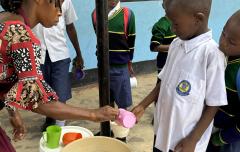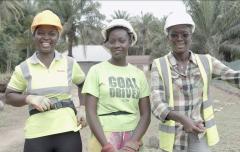Major oil industry players agree to end wasteful routine gas flaring
Washington, April 17 2015 – Major oil companies and oil-producing countries that currently carry out more than 40 percent of global gas flaring have committed for the first time to ending the wasteful practice of routine flaring at oil production sites by 2030 at the latest, and more are expected to join.
The “Zero Routine Flaring by 2030” initiative – already endorsed by nine countries, 10 oil companies and five development institutions, as well as the Sustainable Energy for All initiative – was officially launched in Washington by United Nations Secretary-General Ban Ki-moon and World Bank Group President Jim Yong Kim.
They were joined by Royal Dutch Shell Chairman Jorma Ollila, Statoil CEO Eldar Sætre, Norwegian Foreign Minister Børge Brende and Gabonese Minister of Petroleum Etienne Dieudonne Ngoubou, plus several other senior government and corporate officials and representatives of international development banks.
Every year, around 140 billion cubic meters of natural gas produced together with oil is burned or “flared” at thousands of oil fields around the world. This results in more than 300 million tons of CO2 being emitted to the atmosphere – equivalent to emissions from approximately 77 million cars.
If this amount of gas were used for power generation, it could provide more electricity (750bn kWh) than the entire African continent is consuming today. But currently, the gas is flared for a variety of technical, regulatory, and economic reasons, or because its use is not given high priority.
“Gas flaring is a visual reminder that we are wastefully sending CO2 into the atmosphere,” said World Bank President Jim Yong Kim. “We can do something about this. Together we can take concrete action to end flaring and to use this valuable natural resource to light the darkness for those without electricity.”
By endorsing the initiative, governments, oil companies and development institutions recognize that routine gas flaring is unsustainable from a resource management and environmental perspective. They agree to cooperate to eliminate ongoing routine flaring as soon as possible—and in any case no later than 2030.
The endorsing producers, who collectively represent more than 40 percent of global gas flaring, will publicly report their flaring and progress towards the target on an annual basis, and undertake not to conduct routine flaring in new oil field developments. Governments will provide an operating environment conducive to investments and to the development of functioning energy markets.
Oil companies and governments that have yet to endorse the initiative are currently undertaking comprehensive reviews of their gas flaring. Many are expected to join the Initiative in the coming months.
“As we head towards the adoption of a meaningful new international climate agreement in Paris in December, these countries and companies are demonstrating real climate action,” said U.N. Secretary-General Ban Ki-moon. “Reducing gas flaring can make a significant contribution towards mitigating climate change. I appeal to all oil-producing countries and companies to join this important initiative.”
The World Bank has been active on this issue for 15 years, as a founding member of the Global Gas Flaring Reduction Partnership (GGFR). The Bank works with SEforALL and its partners in GGFR to increase the use of associated gas by helping remove the technical and regulatory barriers to flaring reduction.
Phasing out gas flaring from oil production has also been identified as one of SEforALL’s High Impact Opportunities, promoting multi-stakeholder cooperation between governments and companies, at both national and regional level, along the full gas value chain.
“The strong support for this initiative by so many major players in the oil and gas industry is a real milestone,” said SEforALL CEO Kandeh Yumkella. “The routine flaring of gas is not just an environmental threat, but a shocking waste of a resource that can be tapped to provide energy to those who currently have none. The benefits of curbing that waste will be far-reaching, for both the planet and its people.”
The following have endorsed the “Zero Routine Flaring by 2030” initiative (in order of date of endorsement received).
Click here to view the endorser statements
| Governments | Companies | Development Institutions |
| Norway | TOTAL | The World Bank |
| Cameroon | Statoil | United Nations Sustainable Energy for All (SEforALL) |
| Russian Federation | Eni | European Bank for Reconstruction and Development (EBRD) |
| Kazakhstan | Societé Nationale des Hydrocarbures (SNH – Cameroon) | African Development Bank (AfDB) |
| Gabon | State Oil Company of the Azerbaijan Republic (SOCAR) | Asian Development Bank (ADB) |
| Uzbekistan | Petroamazonas EP (Ecuador) | Islamic Development Bank |
| Republic of Congo | Royal Dutch Shell | |
| Angola | Societé Nationale des Petroles du Congo (SNPC) | |
| France | Kuwait Oil Company | |
| BG Group |



